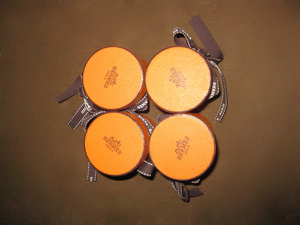Consider this another one of my educational intellectual property posts. The take away is similar to my previous fashion law posts: in fashion, imitation can be seen as infringement--not flattery.
I found these blinged out iPhone cases on an Etsy's seller's page and made a collage out of them for your viewing pleasure. From the looks of it, the seller,
slave2beauty, is truly talented. Unfortunately, these glam cases are okay for personal use but turning a profit on someone else's intellectual property? Not so okay.
 |
I am reposting these images under my Fair Use rights, not to be confused with copyright infringement!  |
How do these cases tie into intellectual property (IP) issues, and particularly fashion law?
Well, if you have not guessed it, trademark law is implicated here.
I wonder how long this user will make these cases before receiving a cease and desist letter*. Not long if someone forwards my blog post to Mr. Pantalony (the lawyer who
sent U Penn Law School a cease and desist). Slave2beauty opened up shop March 6, 2012 so it is likely that her work just has not yet come to the attention of relevant IP owners. I think Louis Vuitton and Lady Gaga rigorously police their brands, so the death of these
cute infringing phone accessories may come soon.
Would you buy accessories like these even though they do not support the brand owner? I am not afraid to say that I report on counterfeiters all the time. Maybe one day I will get paid for it too! ;) Lucky for Etsy companies, Etsy asks that claims of infringement be signed by the IP owner or person authorized to act on behalf of the owner, which is on par with the Digital Millennium Copyright Act.
I do not feel badly about the infringer getting stopped from profiting off of these works but I do wish there were more flexibility in the fashion world, wherein a person like this Etsy seller could easily pitch ideas of these creations to brands. It is just that allowing/licensing people to trademarks is dangerous for brands. It is dangerous because brands may lose track of how their trademarks are being used and even if they develop a contract with a second user, wherein the IP owner is not liable for torts arising from the second user's products, the IP owner can get a tarnished image from bad use. Also, if trademark owners do not exercise quality control they lose their trademarks.
A trademark owner who wants to license use of IP must also be careful that the second user will not be considered a franchisee. A franchising relationship would be bad for the IP owner because it is difficult to get out of such a channel relationship: If a court determines that it is a franchise agreement, it is hard not to renew the contract when it expires. A front-end negative consequence of a determination that a franchise agreement exists is that the trademark owner is supposed to provide the franchisee with an offering circular with all risks. The IP owner can get in trouble for not providing proper franchising material.
Although this Etsy seller might think she is paying homage to popular brands like Louis Vuitton, Chanel, MAC cosmetics, Swarvoski and Lady Gaga, using these trademarks without permission of the trademark owner is trademark infringement.
Any of these aforementioned brands can bring a successful lawsuit against someone making products like this Etsy user. Let's say the user thinks she is not doing anything wrong because she is not actually making a counterfeit of an existing item. To that, I say trademark infringement is not synonymous with counterfeit. When a trademark is used in connection with products or services in a way that may lead a viewer to think the product is connected to the brand the possibility of a problem exists. The person doing the buying does not have to be the party being tricked. Like with these phone cases, the people buying from Etsy most likely realize the lack of connection to the designer. Yet someone who sees this case in use by another person may mistaken the case for being one made by the brand. If quality is a problem then the viewer may falsely attach the negative quality with the brand. On the other hand, if the brand sells or wants to cell such accessories the products pictured above might compete with the brand. This is one of those situations where ignorance of the law is not an excuse.
Do you agree that products like these hurt the brand owners?
♥ Thanks for reading and supporting my blog! ♥
*a cease and desist letter is a notice sent by the IP owner or representative to stop use of IP. See this post.
























